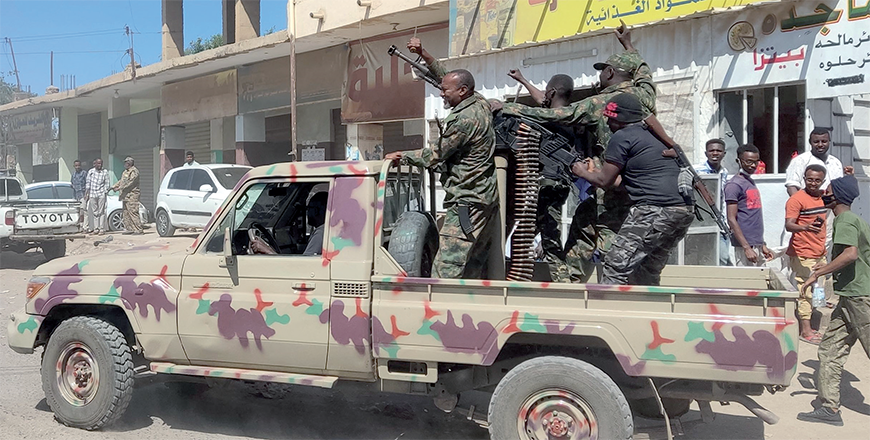You are here
Hundreds flee Khartoum district after shelling kills 19
By AFP - Sep 06,2023 - Last updated at Sep 06,2023
WAD MADANI, Sudan — Hundreds of families fled on Wednesday from a Khartoum suburb where Sudanese army shelling killed 19 civilians the previous evening, activists and residents told AFP.
The exodus adds to the almost 2.8 million already displaced from the Sudanese capital, whose pre-war population was around five million — since fighting began on April 15 between the Sudanese Armed Forces and paramilitary Rapid Support Forces (RSF).
"Hundreds of families are fleeing Ombada," a district of Omdurman, Khartoum's sister city across the Nile, a resident of the area said. The person asked for anonymity because of security reasons.
Another resident, also declining to be identified, said "combat has intensified since Tuesday" and included air strikes on Wednesday.
The Sudanese Armed Forces (SAF) control the skies over Khartoum and have carried out regular air strikes while RSF fighters dominate the city's streets.
On Tuesday evening the Ombada resistance committee said the army had "bombarded the paramilitaries with artillery and drones".
"These rounds missed their targets and 19 civilians were killed," the committee added in a statement on Facebook.
Such committees once organised pro-democracy rallies but now provide a range of community assistance and relief during the war.
The RSF has for years had bases in residential areas. But during the war the United States and Saudi Arabia, which earlier mediated unsuccessful ceasefires, accused the paramilitaries of occupying "civilian homes, private businesses, and public buildings", some of which were looted.
The US-supported Sudan Conflict Observatory has said the SAF "would still be required to ensure that civilian harm is minimised regardless of whether a target has been made a legitimate military target".
On Wednesday, residents in various districts of the Khartoum area reported fighting between SAF, led by General Abdel Fattah Al Burhan, and the RSF headed by General Mohamed Hamdan Daglo.
The latest casualties come after 20 civilians died at the weekend in what activists said was an air strike in Khartoum's south.
The war had already killed around 5,000 people, according to data from the Armed Conflict Location & Event Data Project.
More than 4.8 million have been internally displaced or fled to neighbouring countries, says the UN, which expects those numbers to rise further.
On Monday it more than doubled its aid appeal, which is now at $1 billion, to assist nearly two million people expected to flee Sudan for five neighbouring countries by the end of this year.
The United States slapped sanctions on top officials of RSF Wednesday for a range of alleged murders and rights abuses, including the killing of the governor of West Darfur.
At the same time, the State Department announced $163 million in new humanitarian assistance to help victims and refugees of Sudan’s nearly five-month-old civil war.
The US Treasury sanctioned RSF senior commander Abdelrahim Hamdan Daglo and the brother of Mohamed Hamdan Daglo, leader of the paramilitary RSF.
Under Abdelrahim Daglo, the Treasury said, RSF members “have engaged in acts of violence and human rights abuses, including the massacre of civilians, ethnic killings and use of sexual violence”.
It said that many of the abuses took place in the Darfur region of Sudan.
The US State Department meanwhile placed RSF general and West Darfur sector commander Abdul Rahman Juma on its blacklist for what it called “his involvement in a gross violation of human rights”.
“According to credible sources, on June 15, 2023, RSF forces led by Gen. Juma kidnapped and killed the governor of West Darfur, Khamis Abbakar, and his brother,” the State Department said.
It said the murder came just hours after Abbakar publicly condemned the RSF.
The sanctions came as the Sudanese Armed Forces and the RSF continued to fight for control of the country.
Repeated efforts by outside groups have failed to produce a durable ceasefire between the two sides, led by rival generals.
US Treasury sanctions generally aim to make it harder for blacklisted persons or businesses to operate internationally by forbidding Americans or US-based businesses, including foreign banks with US branches, from transactions with them.
They also freeze any assets the targeted person has under US jurisdiction.
The State Department’s action places US visa restrictions on Juma.
Separately, while visiting Chad, US Ambassador to the United Nations Linda Thomas-Greenfield announced $163 million in aid to help people affected by the civil war.
The State Department said more than 24.7 million people in Sudan need humanitarian assistance.
Some 3.6 million have been forced to flee their homes to other parts of Sudan for avoid the war.
Another one million have fled Sudan into neighbouring countries, the State Department said.
Related Articles
DOHA — Sudanese army chief Abdel Fattah Al Burhan met Qatar's emir on Thursday during his third trip abroad since war broke out in April, af
AL JAZIRA STATE, Sudan — Bombardments by the Sudanese Armed Forces (SAF) killed seven civilians on Sunday in the White Nile state village of
KHARTOUM — Air strikes killed or wounded more than two dozen civilians in Khartoum on Saturday, a citizens' group said, as medics reported h




















